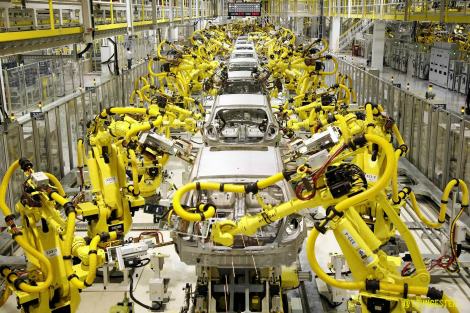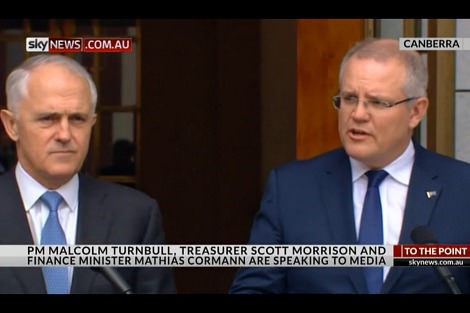Section: Economics
There are more than 200 results, only the first 200 are displayed here.
-

ECONOMICS
- David James
- 07 March 2017
17 Comments
Witnessing the debate over Sunday penalty rates, an intriguing pattern of thinking emerged. It can be characterised as a microcosm/macrocosm duality. Those arguing for lower Sunday wage rates demonstrate their case by talking about individual businesses, the micro approach: 'Many businesses would love to open on a Sunday and if wage rates were lower, they would. Unleash those businesses and greater employment will follow.' Superficially impressive, this does not survive much scrutiny.
READ MORE 
-

ECONOMICS
- David James
- 07 February 2017
10 Comments
Many defenders of globalisation express frustration at the rise of Trump and what they see as an ignorant and self-defeating backlash against its virtues. But they have no answer to the most pressing question: Is the global system there to serve people, or are people there to serve the global system? They also never address a central contradiction of globalisation: that capital is free to move, but for the most part people are not, unless they belong to the elite ranks.
READ MORE 
-

ECONOMICS
- Rachel Kurzyp
- 16 December 2016
8 Comments
Studies have found that in Australia, groups with the poorest financial awareness and skills are those under 25, those with no formal post-secondary education, those on low incomes and working 'blue collar occupations', and women. While it makes sense to provide these groups with financial information on home loans and super, this wouldn't have helped my mother when she had to decide between, say, buying groceries for the week or getting the car serviced.
READ MORE 
-

ECONOMICS
- Veronica Sheen
- 13 December 2016
5 Comments
Over the last two decades we have seen a process of job polarisation. There has been growth in high end jobs, but mostly in low end jobs, the outcome of which has been the hollowing out of middle level jobs. This hollowing out of the middle also relates to greater wealth polarisation, as French economist Thomas Piketty has brought to light. The labour market is under a lot of pressure from many angles, so what does this mean for the project of women's equal opportunity in employment?
READ MORE
-

ECONOMICS
- David James
- 21 November 2016
9 Comments
The idea that machines will replace humans, transforming the work force, is far from new. As technology develops at an accelerating pace, there is growing concern that new social divisions are emerging. While there are signs of deepening social divisions between the rich and the rest of the working population, previous predictions of a collapse in employment have proven to be wrong. This is largely because a confusion arises from conflating production and transactions. They are not the same thing.
READ MORE
-

ECONOMICS
- David James
- 10 October 2016
2 Comments
The strategy of the Big Four banks' appearance in parliament was clear enough. Blame the whole thing on a need to improve impersonal 'processes', imply that there have been a few bad apples but overall things are fine, and promise to do better in the future. The greatest challenge was probably to hide the smirks. A royal commission is being held up as an alternative, and no doubt it would be more effective. But a royal commission would not address the main issue.
READ MORE 
-

ECONOMICS
- Andrew Hamilton
- 20 September 2016
4 Comments
It is a welcome change to see budgets spoken of in moral terms. The government recently insisted on a moral responsibility to future generations to fix the deficit. And the Australian Catholic bishops welcomed on moral grounds the compromise that saw dropped from the budget measures which would further disadvantage vulnerable people. The difference was that the government's argument was focused on the budget, whereas the bishops' focused on particular groups of people.
READ MORE 
-

ECONOMICS
- David James
- 13 September 2016
18 Comments
The argument that putting government operations into private hands ensures that things will run better and society will benefit is not merely a stretch; it is in many respects patently false. The argument is based on the claim that the market always produces superior price signals. Yet one area where private enterprise definitely fails is long term stability. If there is an expectation that a privatised service should last in the long term, and usually there is, then selling it to business is a bad choice.
READ MORE 
-

ECONOMICS
Had Greece decided to exit the EU last year the consequences would have been far greater than Brexit, because Greece uses the euro, whereas Britain has the pound. British interest rates are not set in Brussels, they are set by the Bank of England. And it has an independent fiscal and budgetary system, to the extent that it is possible. The British government has been imposing 'austerity' measures because it subscribes to neoliberal orthodoxy, not because it is being told to do so by Brussels or Germany.
READ MORE 
-

ECONOMICS
There is little doubt that the means to dramatically reduce the amount of pollution produced by developed economies is already theoretically available. It is perfectly possible to redesign industrial systems so that they do not pollute and do not consume finite resources at a rate that is unsustainable. But it requires a radical shift - and the biggest barrier to that shift occurring, the financial markets, is barely even mentioned in discussions of the challenge.
READ MORE 
-

ECONOMICS
- Kate Galloway
- 28 April 2016
14 Comments
Historically, having a largely home-owning population has ensured both the social benefit of housing, and an economic benefit through enforced saving with long-term growth. In contrast, the negative gearing push splits the cultural and economic meaning of home ownership, because it focuses on investment. Negative gearing promotes property ownership but not home ownership. Thus the social benefits of home ownership that we have come to expect give way to bare economic indicators.
READ MORE 
-

ECONOMICS
- David James
- 18 April 2016
11 Comments
Three finance-related events are currently gaining great attention in the media. One is the so-called Panama Papers. Another is the proposal to have a royal commission into the banks. And a third is the furore over the unaffordability of homes and the debate over negative gearing. On the surface they would seem to be quite separate issues. But all three issues demonstrate yet again that banks are, if not the most malign organisations on the planet, then certainly among the most dangerous.
READ MORE 